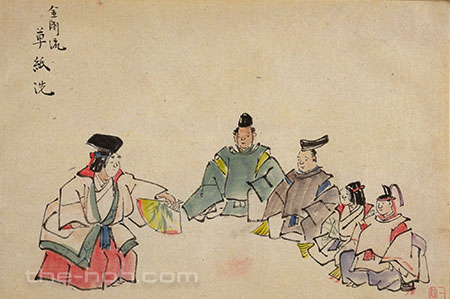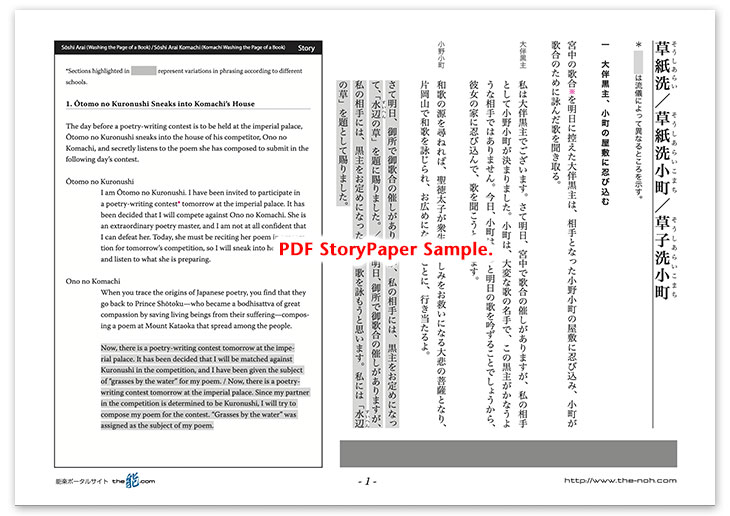
 Sōshi Arai / Sōshi Arai Komachi
Sōshi Arai / Sōshi Arai Komachi

![]()
In summer, during the middle of the fourth month (of the lunar calendar), a poetry-writing contest* is planned at the Seiryō Hall of the imperial palace in Kyoto. Ōtomo no Kuronushi is paired up with Ono no Komachi to compete in poetry-writing at the party. Since Kuronushi is afraid that he will be unable to defeat Komachi in poetry-writing, he sneaks into Komachi’s house and secretly listens to the poem she has prepared to be recited at the contest the following day. He then copies her poem into a volume of Man’yō-shū (Collection of Ten Thousand Leaves), an anthology of ancient poems, trying to make it appear as though she plagiarized her poem from it.
The following day, at the poetry-writing contest, Komachi’s poem is first to be read aloud before the emperor and other renowned poets, including Ki no Tsurayuki. While the emperor praises Komachi’s poem, Kuronushi insists that Komachi submitted a poem she found in Man’yō-shū. Although she raises an objection to his claim, Kuronushi produces the volume into which he added Komachi’s poem as evidence. Heartbroken by such a dishonor, Komachi manages to pull herself together and, carefully reading the Man’yō-shū volume, finds some unnatural parts in the alignment and the color of ink of the poem in question. She therefore asks if she may wash the book’s page and receives the emperor’s permission to do so. When she washes it, the added poem is rinsed right off of the page, exposing Kuronushi’s wicked trick. Kuronushi leaves his seat with the intention of committing suicide, but Komachi calls out after Kuronushi. She forgives him for his misdeed because she thinks he only did it out of his passion for poetry. As the emperor also forgives him, Kuronushi returns to his seat. Now no bitterness separates Komachi and Kuronushi, and the party takes on a festive mood. Komachi praises the reign of the emperor and performs a dance lauding the virtues of poetry.
*Poetry-writing Contest: A form of refined entertainment enjoyed by nobles. Participants were parted to the right and the left and pairs competed against each other in composing poems.
![]()
This play has no basis in historical fact; rather, it is a fictional story with an “all-star” cast whose members are historically famous poets. This bold innovation makes this piece very interesting and entertaining. The drama depicts Ōtomo no Kuronushi as an evil man plotting someone’s downfall, while describing Ono no Komachi as an unparalleled poetry master and paragon of justice. Although the stage is set at an elegant poetry party in the imperial palace, this play depicts dark human emotions, which makes this fictional drama unforgettable and true-to-life.
The highlight of this drama is the scene in which Komachi, who fell prey to Kuronushi’s plot, washes the page of the book in order to prove her innocence. Justice prevails and the evil plot is laid bare. The scene in which she washes the page of the book and rinses off the added poem is quite dramatic. Leading up to this climactic scene is beautiful chanting that uses the word ‘wash’ in many plays-on-words and reminds people of many ancient poems. The audience should enjoy this chanting that adds to the excitement.
After Kuronushi’s wrongdoing has been revealed, he tries to kill himself, but Komachi stops him. She forgives him as he committed the wicked deed due to his passion for the art of poetry. The tension is softened even more in the scene in which the emperor also shows that he is not angry with Kuronushi and generously pardons him. At this point, the story takes on a festive atmosphere, followed by Komachi’s beautiful, yet brisk, dance, which will surely be pleasing to the audience. Rather than condemning wrongdoing outright, it is rinsed away with water, guiding us into a realm of refreshing purity, free of bitterness. Letting bygones be bygones ― a wise maxim cultivated in Japanese culture since ages ago—is evident in this scene. In the play, when Komachi washes the page of the book, she is also cleansing Kuronushi’s wickedness as well as the minds of the audience.
STORY PAPER : Sōshi Arai / Sōshi Arai Komachi
Story Paper presents noh chant stories in modern speech, with story outlines, highlights and more using Adobe PDF format, which can print out and zoom in. Print out the pages and take them with you when you see the actual noh performance.

The copyright of Story Paper is held by the Noh.com. Story Paper is for individual use only. It is prohibited by the copyright law to distribute or publish printed-out Story Paper pages without prior consent. For more information, check the credit and disclaimer pages.



 [Sōshi Arai / Sōshi Arai Komachi : Story Paper PDF : 650KB
[Sōshi Arai / Sōshi Arai Komachi : Story Paper PDF : 650KB